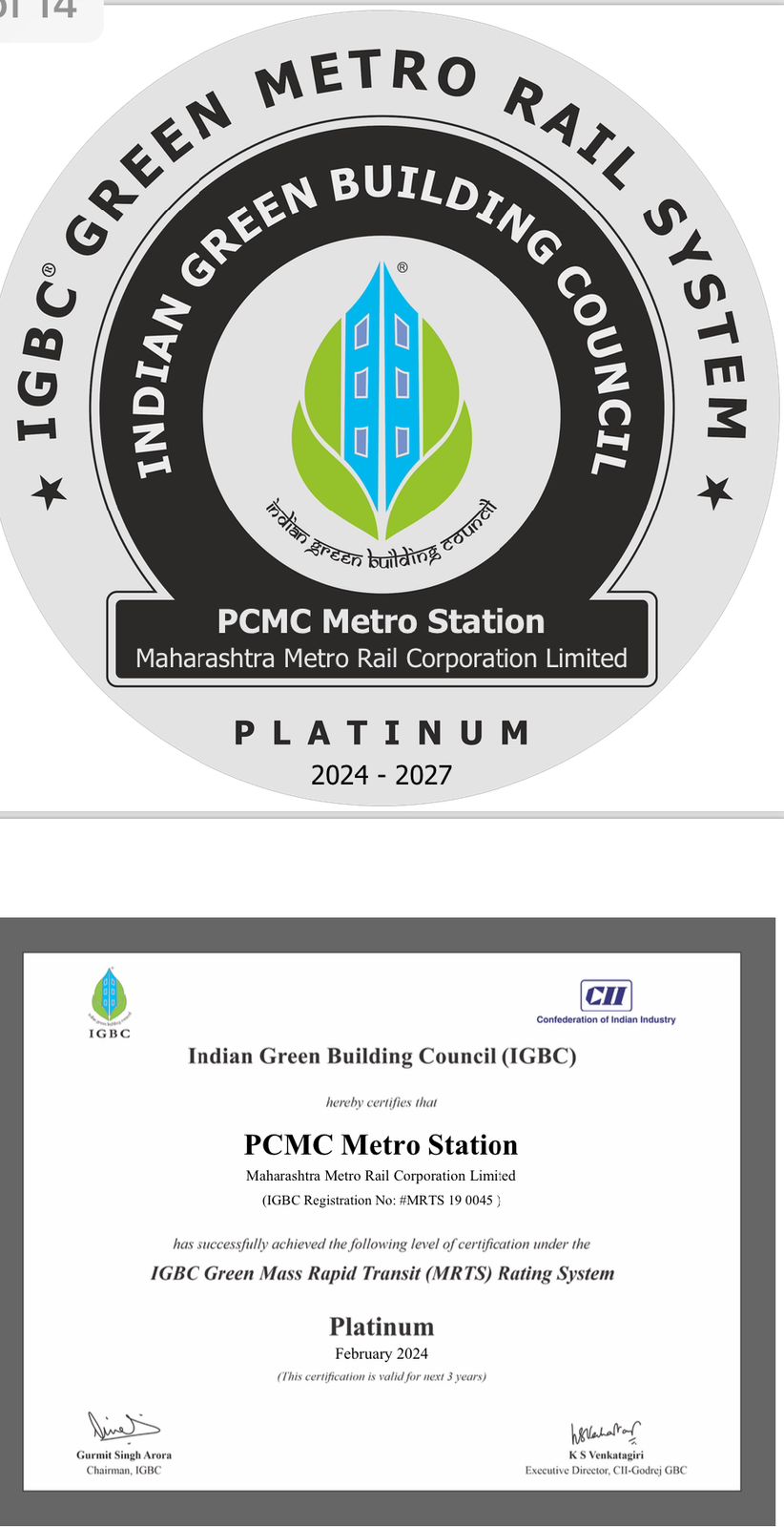7 Stations of Pune Metro Gets the IGBC Platinum Rating under MRTS Elevated Stations Category
| Pune Metro Rail Project Receives IGBC Platinum Rating for Environmental Excellence
The Karbhari News Service – The Maha Metro’s Pune Metro Rail Project has been honoured with the highest rating of the prestigious ‘Project Award for IGBC’, Platinum Rating for the 07 Elevated stations, namely ‘PCMC, Sant Tukaram Nagar, Bhosari, Kasarwadi, Phugewadi, Dapodi, Bopodi. Platinum certification is the highest recognition from the various categories of IGBC awards. Pune Metro received the IGBC certification.
Pune Metro Rail Project consists of two corridors, North- South Corridor (Purple line) and East-West Corridor (Aqua line) with a total length of 33.2 KM and 30 stations. Length of the elevated section is 27.2 KM and length of the underground section is 6 KM. 23.66 km is currently open for public and work on the remaining 9 km stretch is going on in full swing.
The Indian Green Building Council (IGBC), a part of the Confederation of Indian Industry (CII), was formed in the year 2001. It serves as India’s premier certification body and is headquartered in Hyderabad. Additionally, IGBC is one of the five countries represented on the board of the World Green Building Council, where it engages in discussions on global issues at COP and similar global platforms. The threshold criteria for certification/pre-certification levels are as follows: certified, recognized as best practice; Silver, acknowledged for outstanding performance; Gold, recognised for national excellence; and Platinum rating, recognised as global leadership, representing the highest certification level awarded by IGBC. IGBC acknowledges Green New Buildings that achieve one of the aforementioned rating levels with a formal letter of certification and a mountable plaque.
The Indian Green Building Council (IGBC) has launched IGBC Green Mass Rapid Transit System (MRTS) rating to encourage green concepts in the design, construction & operation of all new Rail based MRTS projects. The rating system helps to address National priorities like conserving natural resources, demand side energy & water efficiency, adoption of renewable energy, management of waste and commuter health & comfort. 07 Elevated stations of Pune Metro Rail, namely ‘PCMC, Sant Tukaram Nagar, Bhosari, Kasarwadi, Phugewadi, Dapodi, Bopodi were evaluated according to this system and the Final Rating were then given.
In addition to these 7 stations, evaluations for other stations, namely Vanaz, Anand Nagar, Ideal Colony, Garware College, Deccan Gymkhana, Chhatrapati Sambhaji Udyan, PMC, Mangalwar Peth, Pune Railway Station, Ruby Hall Clinic in Line 2, and Shivaji Nagar Metro Station and Civil Court Metro Station in Line 1, are currently in progress. In the future, all stations of Metro Lines 1 and 2 will be eligible for the IGBC’s topmost rankings.
The IGBC organized the assessment into six environmental categories as defined by the IGBC Green Mass Rapid Transit System Rating. These categories include Site Selection & Planning, Water Efficiency, Energy Efficiency, Material Conservation, Indoor Environment & Comfort, and Innovation in Design & Construction. After successful evaluation in all categories, the Pune Metro received the IGBC Platinum certification.
From the project’s conceptualization to its implementation, Maha Metro has consistently embraced environmentally friendly practices. Beginning at the pre-design stage, the adoption of low-carbon concepts has been integral to every construction phase. Initiatives such as using fly ash bricks, ensuring the adequate disposal of construction and demolition waste, creating airy and comfortable interiors, incorporating energy-efficient designs, implementing rainwater harvesting systems, and extensively utilizing solar energy exemplify Maha Metro’s commitment to sustainability. Elaborate landscaping efforts beneath the Pune Metro viaduct further contribute to a holistic approach that significantly reduces energy consumption and the carbon footprint throughout the project’s construction and operational phases.
Also, the Pune Metro project has implemented a wide array of measures to minimize the negative impacts of construction activities on the environment. This includes preserving topsoil, implementing wheel washing facilities, and managing waste and pollution effectively. Adequate facilities such as personal protective equipment, first-aid and emergency facilities, sanitation facilities.
Additionally, the project emphasizes seamless integration with other modes of transport like bus terminals and railway stations to facilitate easy connectivity for commuters. Plans for feeder bus services, bicycle parking spaces, and promotion of alternative fuel vehicles further enhance intermodal commuter transport. Moreover, the project places a strong emphasis on preserving trees and enhancing vegetation, as evidenced by the extensive tree survey conducted, compensatory afforestation efforts, and native vegetation planning.
Various measures are also in place to mitigate the urban heat island effect and promote energy efficiency through the use of eco-friendly refrigerants, solar PV systems (Current capacity is 4300 KWp and generating daily average electricity of 20,000 KWh), and efficient water fixtures. Waste management, materials with recycled content, and local sourcing of materials further contribute to the project’s sustainability goals. Additionally, initiatives such as green education, indoor air quality monitoring, and innovation in design and construction underscore the project’s commitment to environmental responsibility and sustainability.
The Pune Metro Rail Project’s achievement of the IGBC Platinum Rating for environmental excellence underscores its unwavering commitment to sustainable development. From embracing environmentally friendly practices during conceptualization to implementing innovative solutions throughout construction and operation, the project sets a benchmark for green initiatives in mass transit systems. With its comprehensive approach encompassing various environmental categories, the Pune Metro not only enhances commuter experience but also prioritizes the preservation of natural resources and the well-being of the community. As the project continues to evolve, its dedication to sustainability serves as a model for future urban transportation endeavours, paving the way for a greener and more sustainable future.
